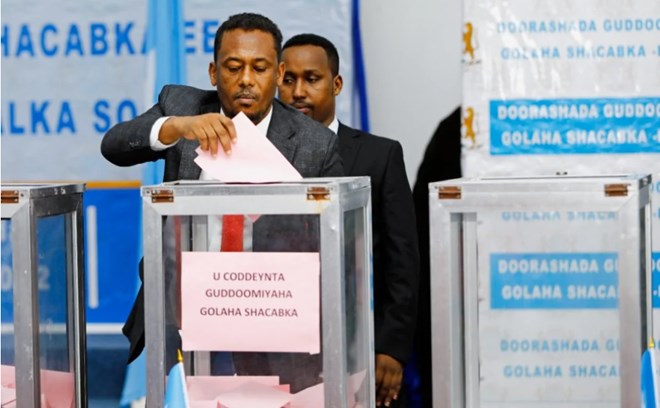Somalia’s lower house elected former Commerce Minister Adan Madobe as the new speaker on Thursday. He was sworn in on April 14, 2022, with 64 percent of the vote among the 275 new members of the Lower House.
This comes after previous President Mohamed Abdullahi Mohamed, better known as (Farmaajo), attempted to prolong the election process for more than a year, including two unsuccessful coup attempts. Though Madobe’s election to the presidency was a watershed moment, it came at a heavy cost, with political violence displacing tens of thousands across the country, most notably in Mogadishu, the capital. Outside partners such as the EU and the US became tired of the protracted process, issuing ineffective sanctions and warnings visa bans as punishment to Farmaajo. Now, after the swearing-in of the new parliament, Somalia is at a crossroads with the upcoming presidential election. The last mile of the election demands hands-on management from the United States and the EU to avoid the collapse of the Somali state.
Farmaajo’s passage of universal suffrage, often known as One Person One Vote, caused the election to be postponed (1P1V). From the start, 1P1V had a number of faults. First, it raised the issue of how to deal with Somaliland, given that delegates are unable to visit the country, let alone represent it in 1P1V. The next problem was registering voters in the absence of a reliable census count. Above all, security was a major concern, with the administration unable to secure voting locations. Farmaajo took advantage of these flaws by ignoring security and voter registration. As the process progressed, Farmaajo became more encouraged by the United States’ and European Union’s passivity, allowing him to erode democratic principles even further. He enlisted the help of UN Special Representative for Somalia James Swan and his ally, African Union Special Representative for Somalia, African Union Special Representative for Somalia, African Union Special Representative for Somalia, AfricanUnion special representative Ambassador Francisco Madeira to help do his bidding. Madeira was viewed as Farmaajo’s right-hand man, and he was instrumental in dismantling Somalia’s democratic and security institutions by expediting Somalia’s withdrawal from African Union Transition Mission (ATMIS) and creating a security vacuum.
Keeping Somalia’s Last Mile Safe
Al-Shabab claimed responsibility for bombarding Somalia’s parliament on April 18 when it was attempting to arrange a date for the election of both house speakers and their deputies. This latest strike occurred just one day after a landmine exploded near a member of the Federal Electoral Commission (FEIT). On the same day, Somalia’s police chief and the director of the National Intelligence Agency were accused of attempting assassination and barring freshly elected members of parliament from entering the election venue.
Along with physical safety concerns, there is also worry about a peaceful transition of power. Since taking office, Farmaajo has weakened two key pillars in Somalia’s state-building process: security and broad political unity. The US and the EU should impose heavy sanctions on Farmaajo and his accomplices to protect against political violence and election meddling. Farmaajo’s assets (and the assets of his associates) should be frozen, and his EU and US citizenship should be revoked, as well as travel restrictions. It goes without saying that a secure environment in which legislators can vote without fear is essential. To ensure the integrity of the election process, the US and EU must assist in the movement of election committees, presidential candidates, and and parliament members to secure areas—such as Halane, where Somalia’s international partners are currently staying—until a new president is elected. The United States and EU can also assist Prime Minister Mohamed Hussein Roble by providing additional security measures, such as incorporating Somali, U.S., and British special forces into election security.
For Somalia, a post-civil war country where there is strong precedence of political violence and destruction, it is critical to secure the political process to ensure that Somalia avoids a repeat of past failures.

